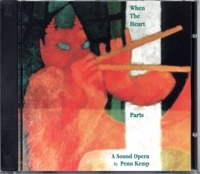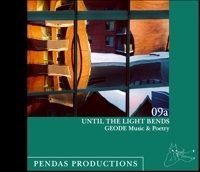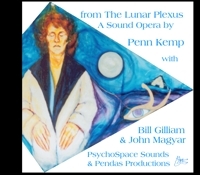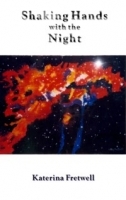
Does contemporary poetry and prose often leave you cold? Do you find that a lot of contemporary poets seem to write for the page and not the stage? Are you tired of going to public readings only to discover that your favourite published poet or novelist is a bad actor and mumbles through the microphone in a barely audible monotone, or, conversely, engages in strange acts of feedback fellatio as s/he screams, declaims, yelps, and yawps his/ her way through incomprehensible free verse lines of self-flagellating psychobabble? Are you tired of being embarrassed every time that touted poet mumbles greeting card verse that doesn’t scan, and you can’t make your way to the door without all the eyes turning in unison and slamming against your ass like a turnstile bar? Maybe you were so desperate you grabbed for the first door handle you could find and found yourself holed up in a broom closet for the duration of the reading. I know at least one person to whom that has happened.
You may be interested to know then that there are poets out there engaged in diy (do-it-yourself) publishing who aren’t rank amateurs and aren’t engaged in exclusively solipsistic navel excavation or primal scream therapy – folks who have something to say, who have found innovative ways of combining new and old technologies to deliver their work.
You’ve no doubt heard Sheri-D Wilson, “the mama of dada,” or Robert Priest, or the Dub poets, or Andrea Thompson, Michael St. George, or bill bissett, or heard (of) the fabled sound poetry troupes, The Four Horsemen, Owen Sound, or, more recently, Christian Bök. All of these poets draw from rich oral traditions extending all the way from aboriginal chanting to Cabaret Voltaire and the origins of dada, to beat, dub, slam, and contemporary spoken word. Some combine the best of theatre and spoken dramatic monologue, or deconstruct syntax down to the interstitial or pre-language vocalizations of phoneme and sub-vocal groans and grunts. Some are content to add performance to narrative; others push the envelope in the direction of pure voice collage, or use the distorting devices of midi, vocodor, and tape manipulation in the manner of the music avant garde of Stockhausen, Cage, Jon Hassell and others.
Few run the gambit of contemporary sound practices or collaborate with other sound poets and musicians the way poet Penn Kemp does, and even fewer have set out on a course of action that has resulted in the sustained production of tapes, chapbooks, magazines, full-length books, CDs, and CD ROMs the way Pendas Productions, and PsychoSpace Sound Studios in Toronto have managed.
I remember Penn Kemp when she was Penny Chalmers, publishing an early book with Robert Sward’s Soft Press back in the early 70’s in Victoria, and starting her on-again, off again little magazine, Twelfth Key; I’m pleased to say that through several changes of nom de plume and residence, now Ontario poet, novelist, publisher, performer extraordinaire Penn Kemp has kept up an active career in education, performance, and publication for decades now; and with the evolution in what she calls “sounding,” has created a unique and powerful library of much of this material under the auspices of her own multimedia consortium Pendas Productions. Pendas produces CDs, CD ROMs, and lovely hand-made desktop books (Pendas Poets Series), anthologies, chapbooks and broadsides in collaboration with Gavin Stairs Fine Editions. Sometimes these projects are underwritten with Canada Council support through their recent Spoken Word program and sometimes not. Either way, the production values have not been sacrificed or compromised along the way, and the risk-taking editorial stance has allowed the various principals and musical/literary collaborators involved to push the envelope and provide an exciting alternative to the literary mainstream and small press publishing.
Unlike most small or micro press publishers as well, Pendas is not driven by a single aesthetic. Both avant garde sound texts and mainstream confessionalist/feminist texts have found a home here.
While much of the writing comes out of the objectivist/projectivist tradition of Olson, Creeley et al, and utilizes drop lines, open field, phonological phrasing and so on, the most predominate feature of the poetry is its rhythmic and melodic verve. On her disk of performance pieces, On Our Own Spoke, Penn Kemp explains the logic of this direction as a natural outgrowth of the childhood desire to sing and having no sense of pitch; to wit, the adult poet moved toward the expressive bits of soundscape and language without the straightjacket of a home key or straight chord progressions and pop song structure. Like the musical avant garde and evolution of free jazz, the poetry has moved along a trajectory from single voice projection to braidings of stanza, sentence, phoneme and phrase. Aleatory and fourth world musicians like Jon Hassell, electronic dancehall groups like Orbital, even the so-called Kraut rock electronic bands from the seventies that spawned Kraftwerk, Tangerine Dream, Popul Vuh, Gong, Brian Eno, and, eventually, the whole contemporary electronica scene of trance tech, trip hop, break beat, ambient house, dark ambient, acid jazz, etc. have, of course, experimented with the mobius strip approach of breaking down musical phrases and coming at them from different directions in a row-row-row-your-boat, polyphonic round, 12-tone music approach of break beat/re-assembly, and like the mobius strip approach, Penn Kemp typically starts out with a single phoneme or noise particle from either end of criss-crossing phrases and repeats the unit particles in chants that eventually make up words, phrases, and complete sentences, allowing the puns that develop and the interstices between words and meaningful, more deliberate utterance to create an analogue performance poetry that is fun, witty, even suspenseful.
Best of all, the Wiccan, chthonic, feminist imagery is woven into lovely, Celtic knots and braids of accessible sound and image too, so nothing seems precious or purely mechanical, but, rather, the poetry returns the reader/listener to the era of pre-writing oral/aural ritual.
If the reader is looking for a way to extend a poetry unit in the direction of sound poetry and performance, the first, live, track, in which all of this is explained to a participant school audience, is indispensable and is as good a place to start as any I know. The audience interaction and charms of the performers come through loud and clear.
 When The Heart Parts: A Sound Opera, as the name implies, offers full-length treatment of spliced sound and dialogue and works like a combination of radio drama – with its strong narrative through-line involving a bedside hospital vigil with the poet’s ailing father – and an avant garde choral work, or voice, instrumental piece like Threnody. It succeeds in wedding the sound poetry and dramatic poetry traditions in a totally contemporary performance piece for multiple voice/personae.
When The Heart Parts: A Sound Opera, as the name implies, offers full-length treatment of spliced sound and dialogue and works like a combination of radio drama – with its strong narrative through-line involving a bedside hospital vigil with the poet’s ailing father – and an avant garde choral work, or voice, instrumental piece like Threnody. It succeeds in wedding the sound poetry and dramatic poetry traditions in a totally contemporary performance piece for multiple voice/personae.
 Until the Light Bends offers poet Susan McMaster and her sound troupe Geode in studio performance of pieces mostly taken from her Palm Poets series book of the same name (Black Moss Press, 2004). Other pieces from Uncommon Prayer (Quarry Press), and Dark Galaxies (Ouroboros, out-of-print) are also performed. The music ranges from avant classicism to blues, folk, and free jazz and primarily provides rhythm, tone colour, and mood backdrop to the straightforward lyric/narrative recitation. Instrumentalists include David Broscoe on clarinet, bassoon, effects; Jennifer Giles on piano; Jamie Gullikson on percussion; John Higney on lap steel guitar; Alrick Huebener on acoustic bass and guitar; and Mark Molner on cello and violin. Voice and instrumental production values are exemplary. Best of all, the music and the poetry both stand close scrutiny and invite multiple listening.
Until the Light Bends offers poet Susan McMaster and her sound troupe Geode in studio performance of pieces mostly taken from her Palm Poets series book of the same name (Black Moss Press, 2004). Other pieces from Uncommon Prayer (Quarry Press), and Dark Galaxies (Ouroboros, out-of-print) are also performed. The music ranges from avant classicism to blues, folk, and free jazz and primarily provides rhythm, tone colour, and mood backdrop to the straightforward lyric/narrative recitation. Instrumentalists include David Broscoe on clarinet, bassoon, effects; Jennifer Giles on piano; Jamie Gullikson on percussion; John Higney on lap steel guitar; Alrick Huebener on acoustic bass and guitar; and Mark Molner on cello and violin. Voice and instrumental production values are exemplary. Best of all, the music and the poetry both stand close scrutiny and invite multiple listening.
 From The Lunar Plexus: A Sound Opera is more avant garde: prepared piano and electronic sounds accompanied by several voices in a weave of sound and lyric poetry. Definitely chthonic, dark ambient: human voice imitating night sounds of bats, insects, unconscious moans, snores, yawns, and animal-like growls and slurs, and rain fall, along with sing-songy child-like skipping song lyric, dreamscape/landscape imagery, etc. The poetry embraces childhood memories and fantastic flights of fancy, moving in and out of conscious memory. Symbolist poetry of the dark other received through the subconscious as well as lyric reminiscence: a heady mix wherein the human voice and piano engage in real dialogue. So much tighter and fully realized than the sort of thing you usually hear on the spoken word stage, where a sax player and bass wail and thump away, oblivious to the tones, moods, and themes of the poetry being presented; both this and the previous disk are thoroughly integrated and effective works of art.
From The Lunar Plexus: A Sound Opera is more avant garde: prepared piano and electronic sounds accompanied by several voices in a weave of sound and lyric poetry. Definitely chthonic, dark ambient: human voice imitating night sounds of bats, insects, unconscious moans, snores, yawns, and animal-like growls and slurs, and rain fall, along with sing-songy child-like skipping song lyric, dreamscape/landscape imagery, etc. The poetry embraces childhood memories and fantastic flights of fancy, moving in and out of conscious memory. Symbolist poetry of the dark other received through the subconscious as well as lyric reminiscence: a heady mix wherein the human voice and piano engage in real dialogue. So much tighter and fully realized than the sort of thing you usually hear on the spoken word stage, where a sax player and bass wail and thump away, oblivious to the tones, moods, and themes of the poetry being presented; both this and the previous disk are thoroughly integrated and effective works of art.
 Ah, but the books listed here are no less powerful for the lack of musical accompaniment, and also feature dialogue in varying forms. Both Vocal Braiding and Gathering Voice employ a weave of voice, two poets reading each others’ and their own work in concert with one another, braiding the lyric voice, as the title of the one volume overtly indicates, stanza by stanza, rather than, or in addition to, poem by poem. I’m struck by the evenness of talent and combined power of the voices here: it’s certainly not a unique idea – Patrick Lane and Lorna Crozier in No Longer Two People, for instance, have successfully wed co-written texts before — but the weave of voices in performance here works like a good baroque chamber piece and adds another dimension to the telling, or story aspect of the writing, and is consistently engaging.
Ah, but the books listed here are no less powerful for the lack of musical accompaniment, and also feature dialogue in varying forms. Both Vocal Braiding and Gathering Voice employ a weave of voice, two poets reading each others’ and their own work in concert with one another, braiding the lyric voice, as the title of the one volume overtly indicates, stanza by stanza, rather than, or in addition to, poem by poem. I’m struck by the evenness of talent and combined power of the voices here: it’s certainly not a unique idea – Patrick Lane and Lorna Crozier in No Longer Two People, for instance, have successfully wed co-written texts before — but the weave of voices in performance here works like a good baroque chamber piece and adds another dimension to the telling, or story aspect of the writing, and is consistently engaging.
 Shaking Hands With the Night is, on the surface, more straightforward: a confessionalist poetic engaging in the thorny prospect of hagiography – in this case, the poet dealing with childhood memories of an alcoholic home, her own alcoholism, and painful road to sobriety. The voice of the other this time is supplied by abstract expressionist ink jet paintings of star nebulae, galaxies, and gelid, frog-spawn-like forms of macrocosmic forces in equipoise or pending birth.
Shaking Hands With the Night is, on the surface, more straightforward: a confessionalist poetic engaging in the thorny prospect of hagiography – in this case, the poet dealing with childhood memories of an alcoholic home, her own alcoholism, and painful road to sobriety. The voice of the other this time is supplied by abstract expressionist ink jet paintings of star nebulae, galaxies, and gelid, frog-spawn-like forms of macrocosmic forces in equipoise or pending birth.
The new technologies of ink jet printing and hand book-binding make the print a little less sharp than laser might have allowed, but the paintings have the look and feel of good water colour originals and add a lot to the pacing and scope of the work.
Katerina Fretwell’s poetry stands comparison with the work of Plath and Sexton too, though she has a more anecdotal and has a more restrained style and voice. I did not find her strident or sentimental in the least and would heartily recommend this book to anyone willing to stray off the commercial path.
Pendas Productions/Gavin Stairs Fine Editions and PsychoSpace Sound are producing marvelous work you may not be able to find or order through your local bookstore or Chapters megalodont. Check them out.
Richard Stevenson lives and teaches in Lethbridge, AB. The most recent of his twenty works of poetry, jazz poetry performance, and creative non-fiction include a memoir, Riding On a Magpie Riff (forthcoming from Black Moss Press this fall), a children’s picture book in rhyming verse, Alex Anklebone & Andy The Dog (Bayeux Arts, 2005), a book of lyric/narrative poetry, Parrot With Tourette’s (Black Moss Palm Poets Series, 2004) and several collections of haiku, senryu, and tanka.
